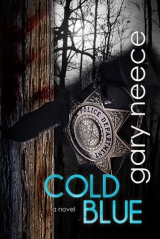
Текст книги "Cold Blue"
Автор книги: Gary Neece
Жанры:
Триллеры
,сообщить о нарушении
Текущая страница: 21 (всего у книги 21 страниц)

Tuesday
February 13
Afternoon
AMBRETTA COLLINS SATIN THE darkened confines of a parked Toyota Sequoia. Most federal officers—even those attempting to “blend in”—drove American-made vehicles. Everyone knew that, and was precisely why she didn’t operate one. Ambretta was not an FBI agent. Ambretta wasn’t even Ambretta.
She did work for the federal government. Though she’d never receive a paycheck stamped “Central Intelligence Agency.” And the memo line would never read, “For kicking Jihad in the balls.”
Her job—her mission—was to identify, infiltrate and decimate terrorist operations inside the US border. The average citizen remained unaware how target-rich her area of operations had become. If they realized the threat America faced on a daily basis, she might not need to be a spy in her own damned country. She’d liken the US border to a sieve, except that a sieve successfully keeps some of the filth out. Thousands of illegals crossed the Mexican border every week. Did people really believe Muslim extremists weren’t among them?
America was a nation of laws—and, to a much larger degree, lawyers; people who’d perverted the constitution to such an extent it left law enforcement unable to do its job. Ambretta doubted the founding fathers meant for constitutional protections to apply to foreign terrorists who entered this country with the sole intent of bringing about its destruction.
More than a few Americans felt these animals should be provided the same liberties enjoyed by United States’ law-abiding citizens. Others believed terrorists should at least be handled under the protocols of the Geneva Convention, though these non-uniformed “combatants” clearly didn’t meet the criteria. These rules shouldn’t be applied to scum who recruited mentally and physically handicapped women and children to blow themselves up in the name of Allah.
Ambretta knew there have always been patriots doing the dirty work of protecting the very freedoms others wished to extend to enemies of this country. Many of those patriots toiled in the shadows. Ambretta was such a person.
She worked in the relocation business, arranging discreet, dank and dark housing for men in search of 72 virgins. Before their dates, they were likely milked of information until the tit ran dry. She couldn’t say for certain. Not privy to the entire process, she constituted a cog in a small but efficient machine. Her service to her country would never be printed in a newspaper, not unless she were someday uncovered. In the event that happened, and even if she were inclined to talk—and she wouldn’t be—what information could she provide?
In many ways, she operated much like the terrorist cells she dismantled. These cells generally had a single objective, remaining unaware of how their plans impacted the overall mission. The cells remained ignorant and independent of one another. If one became compromised, the collective goal remained intact.
Some cells’ only objective was to exist, thereby diverting limited investigative resources from others of more importance. These “dummy” cells were unwitting bait; believing they’d played a larger role than that of a clay pigeon.
If Ambretta were to be uncovered by the evil she battled, torture, rape and death were sure to follow. If she were exposed by American watchdogs and picked up for questioning, at least she’d be in the soft, manicured hands of the FBI. The Federal Bureau of Investigations didn’t resort to such “distasteful” interrogation techniques. Somehow she found their hands-off approach both disturbing and reassuring: disturbing because they afforded the enemy the same protections; reassuring because they wouldn’t break her. The only threat they could muster would be the loss of her freedom, and her freedom she’d willingly give. So many others have given so much more.
If she were imprisoned and did feel compelled to talk for consideration of a lesser sentence, she knew the next disappearing act would be her own. No one could protect her. No facility would be safe.
It didn’t matter. For now, Ambretta wasn’t permitted to have a broader view of the game in which she played. More often than not, she channeled information up through her handler with little filtering back down. Though accustomed to operating in the dark, recent events had proven highly unusual.
Why had she been sent to Tulsa? What exactly had been her mission? And what in the hell were they doing at this graveyard?
Directed by her handler to her current location—a private drive in a sprawling cemetery—he’d looked at her through those creepy mirrored sunglasses of his, told her to wait in the car, and then shuffled off to a gravesite fifty yards distant.
Just six days ago, Ambretta had been on assignment in Atlanta, Georgia. She’d been working a case there for a month when her handler instructed her to pack up and head to Tulsa. She detected a bit of urgency in the old man’s usually cool and indifferent manner.
Her handler was nearly as much a mystery today as when they’d first met. He’d promised a rewarding career, but more importantly he appealed to Ambretta’s fervor to strike back at those who’d cut down her father. It was her handler who’d chosen the name she currently used. She’d always thought Ambretta an odd choice, given most in the business assumed unremarkable aliases.
She’d learned only a few things about the old man’s past. He’d been doing “this” for decades. Before, he’d been a commando in the military. She also knew he’d spent considerable time in a foreign prison where he’d suffered brutal torture sessions that had left him scarred and disfigured. He didn’t complain about the abuse, and only mentioned it to stress that she should always exercise caution.
Otherwise, she knew little about the man. Meeting him here in Tulsa certainly hadn’t changed matters. In fact, she’d found the information pipeline clogged more than ever. Besides FBI credentials and authority over her “fellow” agents, he’d barely given her enough information to complete her assignment.
Her handler told her that the NSA had intercepted a phone call, indicating multiple threats against a company asset, one Jonathan Thorpe. Her handler had subsequently interrogated the source (a man named Kaleb Moment) and obtained from him a list of potential triggermen. Then the old man had provided her the same information that the FBI was set to act upon.
Her task: babysit Sergeant Thorpe while her handler dealt with threats.
Even though Thorpe was supposedly a “company asset,” she was not to break from the cover she’d been given. As the assignment progressed, she began to feel like one of those “dummy” cells. By delving into Thorpe’s background, reading his file, and through her own personal experiences, she doubted the man was connected to “the company” in any capacity. Still, she trusted her handler and dutifully carried on with her mission. After all, she’d become accustomed to things not being what they appeared.
Why then, did John surprise her so? Her attraction had been immediate. She felt his strength upon their first meeting but also sensed a deep affliction—his torment radiating from the depths of those bright green eyes.
He’d tragically lost his family thirteen months prior, and she empathized with the empty shell before her. She’d wallowed in the same despair, and if not for her work, would have drowned in it. John was smart, funny and considerate. His attributes might be the building blocks of her attraction to him, but their shared loss was the mortar.
Knowing full well the assignment was a temporary one, she’d had no intentions of developing feelings for the man. But not everything can be overridden with reason.
Then on Sunday night, the old man informed her that multiple tangos were preparing an ambush in Thorpe’s home. She was to keep John from returning at any cost. Instead she’d upset him to such a degree he’d fled the hotel. His departure stirred within her a mild panic—not because she’d failed her assignment—but because she feared for the wellbeing of a man with whom she’d fallen in love.
Armed with rohypnol, she’d fetched John from the bar and could easily have slipped him the heavy sedative. Despite reason, despite logic, she’d led him to her room where they made love. The night proved not only a physical release, but an emotional one as well. She hoped Thorpe realized the lovemaking had been genuine, that she hadn’t seduced him as part of a job assignment.
Her job assignment—she still didn’t know what it’d been all about. And why was her handler standing over a headstone when they should be en route back to Atlanta?
Because an unexpected meeting with Thorpe would be “messy,” as the old man had put it, Thorpe’s personal truck was still outfitted with a GPS tracker, which they continued to monitor. Someone else would remove the device later. As with many of Ambretta’s assignments, this someone would have no clue why the tracker had been installed; they’d have a simple task to perform, no questions asked.
As Ambretta sat pondering the last six days she heard a ping emanate from her smart phone. She retrieved the do-everything gadget and noted a blip headed their direction. Ambretta stepped out of the SUV; the movement attracted the attention of her handler. She gestured to the old man that they needed to leave immediately.
The old man.
The same mumbling old man who’d stumbled into the open door of a seedy motel room and asked Andrew Phipps for some crack. The same man who’d been spotted leaving Phipps’ back door before jumping his fence. The same shadowy figure who’d glided out of Thorpe’s woods in a ghillie suit.
Now the old man strode briskly toward the waiting Toyota, mirrored sunglasses shielding his eyes from the bright February sun.
Parked on the north end of a long loop, Ambretta realized they wouldn’t make the exit before Thorpe pulled into the private drive. The old man entered the deeply tinted Sequoia, and Ambretta reversed deeper into the cemetery. A few seconds later, Thorpe’s pickup entered the property and parked near the spot they’d just vacated.
“Ben, what in the hell is going on?”
The old man removed his sunglasses. He watched intently as John walked to the same gravesite Ben himself had just visited. Ambretta had never seen much in the way of emotion from her handler before, and was surprised now to see a single tear wind down his wrinkled and scarred left cheek. When Ben turned and told her to drive, she saw the suffering in his old green eyes—those familiar green eyes—and she knew.
THORPE MOVED THROUGH THE GRAVEYARD a free man, though it was hard to tell based on the apprehension in his gait. He’d entered into gun fights with calmer dispositions. As his legs resisted the hike toward his family’s final resting place, his mind drifted back to the events of the last six days.
Someone had gone through great lengths to protect him both physically and legally. Several people—emphasis on the plural—had kept him out of harm’s way and constructed for him irrefutable alibis. No single person would have the resources to accomplish what’d been done for him over the course of a week.
Who and why?
Who was Ambretta Collins, and why had she and others risked their necks for a man they didn’t know? The question gnawed at him. Like smoke, the answer was there, but hell if he could grasp it.
Was Ambretta even her real name? Had she lured him into bed only to keep him isolated, while a person or persons flushed the rats out of his house? Were GPS units attached to his vehicle with the intent of keeping him safe and providing additional “proof” he was not responsible for Sergeant McDonald’s “suicide?” Did Ambretta have genuine feelings for him? Did she love him?
The last two questions were all consuming. He’d never before experienced what he felt now. It ripped him inside out, leaving his heart exposed. He loved another and was desperate to know if she loved him in return. He hated the feeling, despised it; It was a loss of control. Someone held power over him, and it made him feel weak.
Thorpe found himself at the foot of his wife’s grave. He stared down at her marker.
Erica Hessler Thorpe
Mother and daughter, together forever
Love has no end
Thorpe dropped to his knees with a sudden realization, yet perhaps something he’d always really known, a fact he’d repressed over the last year. Thorpe had forced his wife to live for years the way he felt now. Erica had loved him; why couldn’t he comprehend that before?
Had he refused to love her in return? Had the unexpected pregnancy festered resentment?
She hadn’t trapped him, hadn’t pressured him to marry her, hadn’t needed him financially. It took two to have a child. Did he wed out of an overwhelming sense of responsibility? He owed her more than that. He owed their daughter more than that. Thorpe had his character flaws; he’d never pretended otherwise. But Erica and Ella had deserved his best during their short time on this earth.
Thorpe crawled across the ground and sat between his wife and daughter’s markers. They’d been buried for over a year, and he hadn’t visited a single time since the funeral. A tremendous amount of guilt kept him away—a shame caused by more than just his failure to protect his family.
Thorpe sat and told his wife he was sorry. Sorry for not saying he loved her. Sorry for not showing it. Sorry for being absent the night death came calling.
Sorry, sorry, sorry.
The other headstone sat just right of Erica’s.
Ella Ambretta Thorpe
My World
Thorpe had chosen the epitaph. It was simple but said everything. The middle name clawed at him as he read it now.
Coincidence? Had to be. But what were the chances?
Though unusual, his maternal grandmother had been named Ambretta and Thorpe wanted to pass it down to their daughter. Erica loved the name Ella and had chosen it for her future daughter years before. Erica—as mothers generally do—won the argument, and Ella Ambretta came into being.
Thorpe’s love for his daughter had never been in doubt. Shortly after coming home, Ella Ambretta became his everything.
The anguish of losing her had been crushing; a paralyzing despair he hoped never to feel again. He’d rather feel nothing at all. Like many before him, his way of dealing with the pain had been to not deal with it at all. Over the past months, he packed the internal void with hatred and promises of revenge.
Thorpe knew he couldn’t bring back his family, but he could bring those responsible for their murder to justice. His kind. While he’d failed to protect his wife and daughter, he would not fail to avenge them. In the process, he’d lost himself, turning a corner there would be no coming back from.
Those responsible had answered for their sins. Yet he still carried a hole in his heart, a pit he doubted could ever be filled.
Thorpe placed a single red rose on each grave. As he did, he realized there were others who needed to be brought to justice—many others.
And he was good at it.

Thanks to:
Each and every member of the U.S. military: past, present, and future for providing me with the freedom to write.
My fellow LE brothers and sisters for providing the protection to write. Thank you for doing your thankless jobs.
My proofreaders and supporters for your critical eye and words of encouragement.
Sonya, Julia, and Ally for the inspiration. Without my immeasurable love for you, I wouldn’t have been able to imagine the depth of Jonathan Thorpe’s loss.
God, for all those listed above, and for everything else.

Gary Neece is a sergeant and twenty-year veteran of the Tulsa Police Department in Tulsa, Oklahoma. He has vast experience in specialty units focusing on violent crime reduction and drug enforcement. Much of the inspiration for his writing springs from his time in the Special Investigations Division, where he supervised the department’s undercover Vice/Narcotics Unit. He lives near Tulsa with his wife and two daughters.
For more information about Gary Neece and his books, follow him on Face book:
Author Gary Neece/Cold Blue Fanpage
OTHER TITLES BY GARY NEECE

A month has passed since Sergeant Jonathan Thorpe avenged the murder of his family, but his past still haunts. Sins of Our Fathers opens with Thorpe—unaware of a sophisticated plot against his own life—tracking a serial child killer. A bloody encounter leads him to an unlikely ally, and also provides an opportunity for redemption; a young girl is in danger, her life dependent on Thorpe’s lethal skills. Having lost his own daughter to violence, Thorpe vows to save what he once failed to protect. His quest pits him against a formidable enemy and casts him on a collision course with loved ones long thought lost.
Available on Amazon
Table of Contents
Chapter One
Chapter Two
Chapter Three
Chapter Four
Chapter Five
Chapter Six
Chapter Seven
Chapter Eight
Chapter Nine
Chapter Ten
Chapter Eleven
Chapter Twelve
Chapter Thirteen
Chapter Fourteen
Chapter Fifteen
Chapter Sixteen
Chapter Seventeen
Chapter Eighteen
Chapter Nineteen
Chapter Twenty
Chapter Twenty-One
Chapter Twenty-Two
Chapter Twenty-Three
Chapter Twenty-Four
Chapter Twenty-Five
Chapter Twenty-Six
Chapter Twenty-Seven
Chapter Twenty-Eight
Chapter Twenty-Nine
Chapter Thirty
Chapter Thirty-One
Acknowledgments
About the Author








